The Eureka J20 is a technologically-advanced robot vacuum that delivers strong suction and very effective mopping, thanks to an innovative roller mop design. The vacuum is straightforward to set up, although room mapping takes a certain amount of technical knowhow. Floors are left swept and clean, even when stains are more stubborn than average.
Pros
- +
Roller mop cleans brilliantly
- +
Bagless technology
- +
Easy-to-use app
- +
Cleaning schedule functionality
Cons
- –
Large dock station
- –
Low power settings ineffective
Why you can trust TechRadar We spend hours testing every product or service we review, so you can be sure you’re buying the best. Find out more about how we test.
Eureka J20 robot vacuum two-minute review
The Eureka J20 provides the next generation of mopping technology thanks to its RollRenew mopping system. This is one of the best mopping solutions I’ve seen on any robot vacuum. It achieves superior performance by not only mounting the mop pad onto a roller but also spraying fresh water onto it as it rotates around. This helps to ensure the mop is always cleaning the floor with a clean pad. This leaves oscillating mopping solutions in its wake and seems likely to become become the go-to option for customers prepared to pay a premium for the best robot vacuum.
As well as excellent mopping capabilities, the J20 is also very capable when it comes to vacuuming. My tests with crushed digestives biscuits, flour, and oats were adequately dealt with when I increased the suction power to either Turbo or Super Strong. There were times when I needed to carry out a small follow-up sweep, but this was only on larger and more stubborn debris. All in all, the vacuuming performance of the J20 is up there with the best.
LiDAR mapping and AI obstacle detection performed incredibly well, leading to an accurate and reliable map of our house. It handled table legs and other furniture with ease, although this did add to the amount of time required to map the space. Eureka’s app is equally good, with outstanding mapping technology and customizable cleaning schedules.
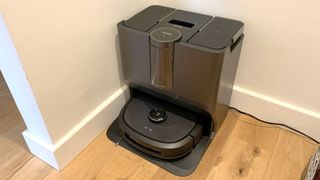
The robot vacuum is only half the story, though. The J20 is backed up by an impressive base station that fulfils a range of duties, including charging, self-emptying, and refilling the vacuum water tank. It carries all of these out with very little fuss; all you have to concern yourself with is making sure the base station is filled up with water and the debris receptacle is emptied every so often. The station is a little on the large side, however, so you’ll want to make sure you have enough room for it before investing in this product.
The design of every part of the vacuum and base station is well considered and perfectly engineered. Premium materials are found throughout, helping not only to improve the user experience but also increase the longevity of the device.
There’s little not to love about the J20. This is a premium robot vacuum solution that delivers great vacuuming and mopping performance. The €1,399 price point will put a lot of people off but if you have the money to cover the investment, there aren’t many better alternatives on the market.
Eureka J20 robot vacuum review: price & availability
- Launched: Summer / fall 2024
- Price EU $1,399 / $1,399 (equivalent to £1,100 / AU$2,075)
- Available in Europe, US and Australia launches to follow, no launch date for UK
At the time of writing the Eureka J20 is available in four European countries: Germany, France, Italy, and Spain. The €1,399 price tag puts it at the higher end of robot vacuum cleaners and TechRadar’s premium price bracket, but that’s reflected in the feature set. Robot vacuums do tend to attract discounts around major shopping events like the Black Friday sales, though, so there’s a chance you might be able to avoid paying that full list price.
In North America the J20 will be available on eureka.com with a retail price of $1,399, although during the US launch period there will be a $300 coupon, making the final price $1,099. An Australian launch is expected but there’s no word on pricing, and so far there’s no mention of a UK launch from Eureka.
- Value score: 4 out of 5
Eureka J20 robot vacuum specs
Swipe to scroll horizontally
| Suction power: | 8,000Pa |
| Speed: | 30cm/s |
| Bin volume: | 3L Dust Bag Capacity |
| Battery life: | 130mins |
| Filtration: | HEPA |
| Noise volume: | 67dB(A) at mopping mode |
| Mop water volume: | clean water box: 210mL, dirty water box: 230mL |
| Water levels: | 4 |
| Mapping: | LDS + dToF; 3D Line Laser |
| Obstacle avoidance: | LDS + dToF; 3D Line Laser |
| Base: | Yes: charging, self-emptying, refilling water tank |
| Smart support: | Supports Google Assistant and Alexa, will support Siri in Q3 2024 |
| Tools: | Comes with a half-fluffy, half-waterproof mop for the robot to step onto the carpet |
| Weight: | 17.98kg (with station) |
Eureka J20 robot vacuum review: design & features
- 8,000 PA vacuum
- RollRenew mopping system
- Bagless self-emptying base station
The Eureka J20 vacuum and base station are relatively compact, especially considering the overall functionality and number of features. That doesn’t mean it’s particularly small, though. With dimensions of 423 x 462 x 452.5mm, you’ll need a fairly good amount of space to keep it out of the way. I was fortunate to have a space in my utility room that meant it wasn’t in the way of foot traffic. If you’re tight on space and have a small hallway or kitchen, you’ll need to look for a smaller unit.
Everything was safely packaged, guaranteeing nothing was harmed in transit. After unboxing everything, I plugged the base station in, placed the robot inside, and waited for it to be fully charged. The robot connects to the charging point through two metal plates, which automatically line up without any requirement for human intervention.
In the meantime, I downloaded the Eureka app, which is essential for use as well as for maximizing all the features. Connecting the robot to the app was a breeze, and my phone was able to find it with no problems at all.
While the robot is off mapping your house, the app displays all the progress in a simple and straightforward floor map. It is only after mapping the whole space that rooms can be labelled and zones specified. All in all, the app is incredibly intuitive and easy to navigate. If you’ve never owned a robot vacuum before, then controlling it from a phone will take a bit of getting used to, but you’ll soon get the hang of it.
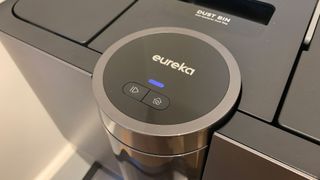
All parts look and feel premium, helping to ensure durability when moving around the house. The reality is that at times it might have to interact with children or pets, but there are no concerns that the J20 won’t be able to withstand the test. The units are made from powder-coated dark grey plastic, helping to hide any scuffs and marks that will inevitably come their way. All parts of the robot and base station are easy to wipe clean.
The robot itself is fairly simple in design, with two buttons located on the top of the unit. One is for sending the robot back to its base station for charging, while the other starts and pauses the cleaning process. The same two buttons are also located on the base station for ease of access.
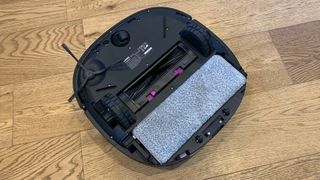
Underneath the robot is where all the magic happens. Sensors and brushes help to keep the robot on track as well as pick up dirt. The mop assembly is the crowning feature of the vacuum. Engineering it onto a belt means the mop pad stays cleaner for longer and that fresh water is regularly applied to the surface being cleaned. This sets it apart from a lot of traditional robot vacuums that only vibrate a mop pad across the surface.
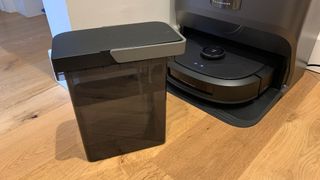
One of the best things about the base station design is how easy it is to remove and insert the various tanks, including the clean water and waste water tanks. These fit seamlessly into the casing and are super easy to fill up/empty.
- Design score: 4 out of 5
Eureka J20 robot vacuum review: performance
- Great vacuuming capabilities
- Roller mop picks up spills nicely
- Fantastic mapping technology
The biggest evolution for Eureka and for the industry as a whole is the proprietary RollRenew mopping system. This did a fantastic job of cleaning up spills, as long as you got the vacuum to work on them pretty quickly; if it was left for a while, the J20 found it harder to take care of them in the time it was gliding over them. More water would have helped but that’s not usually desired, especially on real-wood floors. The J20 performed better than the Eureka E10s, thanks to the roller mop functionality.
Moving onto vacuuming, my tests involved sprinkling a mix of crushed digestives and flour, as well as oats, onto my carpet and hard floor before seeing how the Eureka J20 performed on its Quiet, Standard, Turbo, and Super Strong suction strengths. The lower settings didn’t pick up anywhere near enough debris to make them worthwhile, either on carpet or hard floors.
The Turbo and Super Strong settings were much more capable of picking up the flour and biscuits to a satisfactory standard, although you’ll have to be prepared to put up with nearly 70dB of noise while it’s happening.
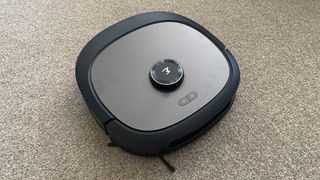
After testing the core elements of vacuuming and mopping, I turned my attention to the amount of noise the device was making. This is important because the quieter the vacuum, the more likely users are going to be able to utilize it at the end of each day without the fear of interrupting a quiet night in.
The audio volume of the J20 increases from 60dB on its lowest suction to 70dB on its highest. This is comparable with Eureka’s other models, such as the E10s, which had an almost identical audio range. The audio levels are not particularly comfortable, especially if you’re trying to relax at the same time. I prefer to put the robot to work either while I’m out during the day or when I’m doing other jobs.
After performing a clean, the J20 will return to its base station and empty its contents. The advertised capacity of the base station receptacle is 75 days, a length of time that is obviously dependent upon your home and how much dirt needs cleaning. In reality, it will need emptying as regularly as any standard upright vacuum would.
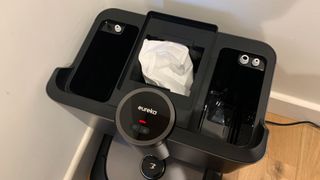
Eureka has always done a fantastic job of integrating state-of-the-art mapping and navigation technology into its robot vacuums. The same is true for its J20 model. Despite taking a while to map out our home and making a number of wrong turns in the process, the resulting map was incredibly accurate. Our rooms have a lot of table legs, which I thought would confuse the robot, but instead it gradually and methodically worked its way around.
The overall performance of the J20 among the best I have ever seen. It effectively picks up dirt, mops up spills, and requires very little human intervention to finish cleaning tasks.
- Performance score: 4.5 out of 5
Eureka J20 robot vacuum review: app
- Intuitive to use
- Specific room and zone mapping
- Ability to schedule cleans
Eureka has managed to create an app that is not only remarkably easy to use but also offers a lot of functionality. Having used the app with the Eureka E10s, I continued to be impressed by all that the app offers.
Downloading and installing the app was an absolute breeze. After connecting the vacuum, I proceeded to carry out an initial mapping of the space. The vacuum and app linked seamlessly to provide a usable scan of the house, including a map of scanned rooms. Each of these can be labelled for easier navigation and customization as well as the ability to set no-go or no-mop zones, perfect for carpeted floors.
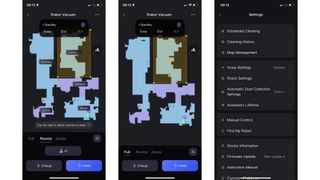
Eureka provides a number of different ways to get your space cleaned. The first is to select specific rooms on the map and hit the clean button. This is ideal if you know you have mess in a set number of rooms but don’t want to carry out a full clean. Alternatively, zones can be specified, which is perfect for cleaning those high-use areas.
By far the easiest and most hassle-free option is to set up scheduled cleans and let the vacuum just crack on with doing what it does best. The app lets you specify a time, a repeat schedule, and a number of cleaning cycles. Each scheduled clean can also include the rooms that you want cleaned.
I found all of these features to be incredibly easy to use but I would understand if someone less tech-savvy needed a little bit of help getting everything set up. There were also occasions when troubleshooting was required and if you weren’t able to work through these problems yourself, then I could see how it could become a little frustrating.
- App score: 4.5 out of 5
Eureka J20 robot vacuum review: battery life
- Battery lasts up to three hours
- Takes around three to four hours to recharge
The 6,400mAh battery is advertised as lasting 180 minutes. This running time is only remotely achievable when used with the lowest level of suction power. You can expect this to reduce by as much as half when using the highest power setting.
Given the fact that this level of suction is required almost all the time, you’ll want to weigh up whether you’re happy with this battery performance. Measuring your space is a good start. I found the robot able to cover in the region of 750-850 square feet per charge.
Recharging the robot from empty takes around three to four hours, which is more than easily achieved between cleans. The robot is also intelligent enough to know when it needs a boost and will return to the base station accordingly.
- Battery life score: 3.5 out of 5
Should you buy the Eureka J20 robot vacuum?
Swipe to scroll horizontally
| Attribute | Notes | Score |
|---|---|---|
| Value | Priced at the higher end of the robot vacuum market, however its feature set means that it’s worth the heavyweight outlay. | 4/5 |
| Design | Quality build that feels resilient, innovative mop assembly, well-engineered base station that’s really easy to maintain. | 4/5 |
| Performance | Great vacuuming on higher power levels, outstanding mopping system handles spills well, requires very little human intervention. | 4.5/5 |
| App | Plenty of functionality and perfect for setting up scheduled cleans just how you want them, but less tech-savvy users might find it hard to navigate. | 4.5/5 |
| Battery life | 180 minutes on lower power settings, but highest settings give you about half that. Full battery charge from empty takes up to four hours. | 3.5/5 |
Buy it if…
The selling-point of the Eureka J20 is the mop that is mounted to a roller. This helps to ensure that fresh water is applied to each new stain, thereby improving the overall performance of the mop.
The J20 robot vacuum transfers all of its debris into the base station every time it returns. This reduces the number of times the main dustbin needs to be emptied.